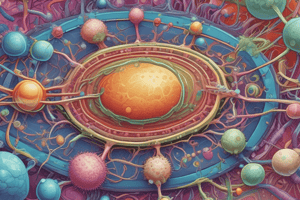Podcast
Questions and Answers
How do membranes grow according to the universal principles of living cells?
How do membranes grow according to the universal principles of living cells?
- By expansion from preexisting lipid bilayers (correct)
- By absorbing nutrients from the environment to increase in size
- By de novo formation of proteins and phospholipids
- By fusing with neighboring cells
Which process regulates the supply of proteins at the level of activation according to the universal principles of living cells?
Which process regulates the supply of proteins at the level of activation according to the universal principles of living cells?
- Degradation
- Rate of translation
- Activation of proteins (correct)
- Expression
What information is required for proteins destined to the nucleus to pass through nuclear pores according to the universal principles of living cells?
What information is required for proteins destined to the nucleus to pass through nuclear pores according to the universal principles of living cells?
- ATP synthesis
- Endoplasmic reticulum structure
- Golgi apparatus formation
- NLS that binds receptors (correct)
According to the universal principles of living cells, how are cell constituents primarily moved?
According to the universal principles of living cells, how are cell constituents primarily moved?
According to the universal principles of living cells, what do one-dimensional chemical sequences in DNA code for?
According to the universal principles of living cells, what do one-dimensional chemical sequences in DNA code for?
Which type of cells have a compartmentalized cytoplasm?
Which type of cells have a compartmentalized cytoplasm?
What is the main advantage of the impermeability of the mitochondrial membrane in eukaryotic cells?
What is the main advantage of the impermeability of the mitochondrial membrane in eukaryotic cells?
What is the function of actin filaments, microtubules, and intermediate filaments in eukaryotic cells?
What is the function of actin filaments, microtubules, and intermediate filaments in eukaryotic cells?
Where is the information needed for cell growth, function, and multiplication found in eukaryotic cells?
Where is the information needed for cell growth, function, and multiplication found in eukaryotic cells?
What are the specialized compartments found in eukaryotic cells that provide advantages such as hydrolytic enzymes and ATP synthesis?
What are the specialized compartments found in eukaryotic cells that provide advantages such as hydrolytic enzymes and ATP synthesis?
How do membranes primarily grow according to the universal principles of living cells?
How do membranes primarily grow according to the universal principles of living cells?
What is the main function of actin filaments, microtubules, and intermediate filaments in eukaryotic cells?
What is the main function of actin filaments, microtubules, and intermediate filaments in eukaryotic cells?
How are cell constituents primarily moved according to the universal principles of living cells?
How are cell constituents primarily moved according to the universal principles of living cells?
What is the main advantage of the impermeability of the mitochondrial membrane in eukaryotic cells?
What is the main advantage of the impermeability of the mitochondrial membrane in eukaryotic cells?
According to the universal principles of living cells, what do one-dimensional chemical sequences in DNA primarily code for?
According to the universal principles of living cells, what do one-dimensional chemical sequences in DNA primarily code for?
What is the main advantage of the impermeability of the mitochondrial membrane in eukaryotic cells?
What is the main advantage of the impermeability of the mitochondrial membrane in eukaryotic cells?
What are the primary functions of actin filaments, microtubules, and intermediate filaments in eukaryotic cells?
What are the primary functions of actin filaments, microtubules, and intermediate filaments in eukaryotic cells?
What is the significance of specialized compartments like lysosomes, peroxisomes, and mitochondria in eukaryotic cells?
What is the significance of specialized compartments like lysosomes, peroxisomes, and mitochondria in eukaryotic cells?
Which statement best describes the role of DNA in eukaryotic cells according to the universal principles of living cells?
Which statement best describes the role of DNA in eukaryotic cells according to the universal principles of living cells?
How do eukaryotes differ from prokaryotes in terms of their cytoplasm's organization?
How do eukaryotes differ from prokaryotes in terms of their cytoplasm's organization?
Flashcards are hidden until you start studying




